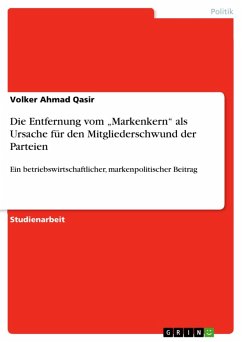
How Individual Rationality can cause Political Constraint that inhibit Financial Support (eBook, PDF)
An Analysis looking at German Political and Domestic Discrepancies after the 2009 Sovereign Debt Crisis
Sofort per Download lieferbar
Statt: 17,95 €**
15,99 €
inkl. MwSt. und vom Verlag festgesetzt.
**Preis der gedruckten Ausgabe (Broschiertes Buch)
Weitere Ausgaben:

PAYBACK Punkte
0 °P sammeln!
Seminar paper from the year 2013 in the subject Politics - Other International Politics Topics, grade: 1,7, University of Freiburg, course: Rational Choice and Neo-Institutionalism, language: English, abstract: The aim of this paper is to analyse the reaction of Germany to the sovereign debt crisis and its policy stance using Rational Choice as an explanatory device. It is suggested, that a very rational approach is employed both by the government and the public. However, with the incisive need to support Greece to prevent an outspread of the crisis, the German government lost public support a...
Seminar paper from the year 2013 in the subject Politics - Other International Politics Topics, grade: 1,7, University of Freiburg, course: Rational Choice and Neo-Institutionalism, language: English, abstract: The aim of this paper is to analyse the reaction of Germany to the sovereign debt crisis and its policy stance using Rational Choice as an explanatory device. It is suggested, that a very rational approach is employed both by the government and the public. However, with the incisive need to support Greece to prevent an outspread of the crisis, the German government lost public support albeit acting rational in its national interest. This paper claims, that missing and wrong communication by the government caused a discrepancy that alienated the public from the national interpretation of the issue. The paper concludes with a recommendation on how the German government should deal with the Euro crisis domestically to tackle the pressing issue effectively. Building upon Axelrod's theory on interstate cooperation, there will be little difficulty to explain Germany's approach to solve the crisis. When it became obvious, however, that Greece would need support or otherwise the crisis could likely spread across Europe, the German government found it hard to raise support for this unpopular policy. Looking into theory, Putnam may offer a good insight why German politics hold a stern position when it comes to financial support, which can be said to follow rational choice. This is true, even after it was more then apparent on a national level that support was necessary and indeed beneficial to German interest. Trying to connect Axelrod's ideas with those of Putnam, it is likely that public opinion within Germany deprives the government of much needed leeway. It is highly suggested that German domestic constraints on state sponsored aid for Greece heavily influence German politics, inhibiting decisive rational choices on the national level. Looking closer on the second level, it appears that the German public also derives its stance from a mostly rational interpretation of the sovereign debt crisis, giving not much heed to the European cause or symbolic traditions, but now inhibits rational decisions on the national level. As the public is susceptible to a rational approach to the issue, this discrepancy results from a communication problem.
Dieser Download kann aus rechtlichen Gründen nur mit Rechnungsadresse in A, B, BG, CY, CZ, D, DK, EW, E, FIN, F, GR, HR, H, IRL, I, LT, L, LR, M, NL, PL, P, R, S, SLO, SK ausgeliefert werden.













